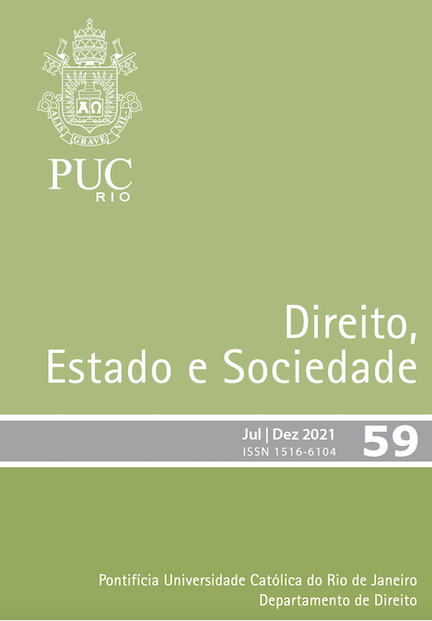Automatismo cerebral - análise crítica e impacto no sistema de imputação de responsabilidades
DOI:
https://doi.org/10.17808/des.59.1245Keywords:
Automatismo cerebral, responsabilidade, livre-arbítrio, determinismo, imputação.Abstract
Resumo: o automatismo cerebral, valendo-se de experimentos científicos, sustenta que a experiência do processo decisório é uma simples ilusão, um processo mental interpretativo de uma resposta cerebral ao estímulo externo. De outro lado, todo o modelo de imputação de responsabilidade pessoal, seja na esfera civil ou criminal, impõe a existência de uma reprovabilidade da conduta. A exclusão do elemento volitivo afasta toda e qualquer responsabilidade, pois não se poderia exigir que o agente agisse de modo diverso, diante da inexistência de uma possibilidade de escolha. A problemática é conexa com a controvérsia filosófica entre deterministas, libertários e compatibilistas. Há profundas implicações não apenas para as estruturas do modelo jurídico de responsabilidade, mas também para a construção de políticas públicas de prevenção e reparação de danos. Mais do que isso, a adoção de uma ou outra perspectiva aponta para uma particular cosmovisão e, por esta, uma peculiar compreensão do que é ser humano.
Palavras-chave: automatismo cerebral, responsabilidade, livre-arbítrio, determinismo,
imputação.
Abstract: The cerebral automatism, using scientific experiments, maintains that the experience of the decision-making process is a simple illusion, a mental process interpretative of a cerebral response to the external stimulus. On the other hand, any model of imputation of personal responsibility, whether in the civil or criminal sphere, imposes the existence of a reproachability of conduct. The exclusion of the volitional element removes all responsibility, since the agent could not be required to act in a different way, in the absence of a choice. The problem is connected with the philosophical controversy between determinists, libertarians, and compatibilists. There are profound implications not only for the structures of the legal model of liability, but also for the construction of public policies for the prevention and repair of damages. More than this, the adoption of one or another perspective points to a particular worldview and, for this, a peculiar understanding of what it is to be human.
Keywords: automatism, responsibility, free will, determinism, imputation
References
AQUINO, Thomás. Suma teológica, IV. São Paulo: Edições Loyola, 2005.
ARENDT, Hannah. Responsibility and Judgment. New York: Shocken Books, 2003
BAYNE. Libet and the case for free will scepticism. In: free will and modern science. Oxford: Oxford University Press, 2011, pp. 25-47.
BROAD. Ética e a história da filosofia. London & Kegan Paul Ltd, 1952.
BUSTAMANTE ALSINA, Jorge. Teoría General de la responsabilidad civil. Buenos Aires: Abelardo Perrot, 1997.
CRICK, Francis Crick. The Astonishing Hypothesis: The Scientific Search for the Soul. New York: Charles Scribner's Sons, 1994.
CROSS, Richard. Medieval Theories of Haecceity. The Stanford Encyclopedia of Philosophy, Edward N. Zalta (ed.), 2014.
DAWKINS, Richard. The Selfish Gene. Oxford: Oxford University Press, 1976.
DE CULPIS. Il danno. Milano: Giuffré, 1979.
DENNETT, Daniel C. Freedom Evolves. Nova York: Penguin group, 2004.
DIAS, J. FIGUEIREDO. Liberdade e culpa direito penal. Coimbra: Coimbra, 1983.
EASTMAN, Nigel; CAMPBELL, Colin. Neuroscience and determination of criminal responsibility. In: Nature reviews Neuroscience • May 2006 DOI: 10.1038/nrn1887. PubMed.
FARAHANY, NITA A. Neuroscience and behavioral genetics in US criminal law: an empirical analysis. In: Journal of Law and the Biosciences, Volume 2, Issue 3, 1 November 2015
HAGGARD, P. e EIMER, M. On the relation between brain potentials and the awareness of voluntary movements, Experimental Brain Research. Experimentelle Hirnforschung. Expérmentation Cérébrale [1999]:128-33.)
HOLBACH, Paul-Henri Thiry, barão d'. Sistema da natureza. São Paulo: M. Fontes, 2010.
INWAGEN, Peter Van. Critical Study of Dennet´s Elbow Room. In: Thinking about free will. Cambridge: Cambridge University Press, 2017. https://doi.org/10.1017/9781316711101.006.
INWAGEN, Peter Van. When Is the Will Free? In: Thinking about free will. Cambridge: Cambridge University Press, 2017 https://doi.org/10.1017/9781316711101.002.
JORGE, Fernando Pessoa. Ensaio sobre os pressupostos da responsabilidade civil. Coimbra: Almedina, 1995.
KAVANAUGH, John F. Who counts as persons? : human identity and the ethics of killing. Whashington, D. C.: Georgetown University Press, 2001.
LARENZ, Karl. Derecho justo fundamentos de ética jurídica. Madrid: Civitas, 1990.
LIBET, Benjamin; Gleason, Curtis A.; Wright, Elwood W.; Pearl, Dennis K. (1983). Time of Conscious Intention to Act in Relation to Onset of Cerebral Activity (Readiness-Potential) - The Unconscious Initiation of a Freely Voluntary Act. Brain. 106: 623-642, 1983 https://doi.org/10.1093/brain/106.3.623.
MILLER, Jeff; SHEPHERDSON, Peter e TREVENA, Judy. Effects of Clock Monitoring on eletroencephalographic activity - is unconscious movement Initiation an artifact of the clock?. Psychological Science 22 (janeiro de 2011): 103-109 https://doi.org/10.1177/0956797610391100.
PASCAL, Blaise. Pensamentos. Edição eletrônica: Ed Ridendo Castigat Mores (www.ngarcia.org).
SPINOZA, Baruch. Ética [tradução de Tomaz Tadeu]. Belo Horizonte: Autêntica Editora, 2009.
SWINBURNE. Richard. Dualism and the determination of action. In: free will and modern science. Oxford: Oxford University Press, 2011 https://doi.org/10.5871/bacad/9780197264898.003.0005.
SWINBURNE, Richard. Mind, brain & free will. Oxford: Oxford University Press, 2013 https://doi.org/10.1093/mind/fzu097.
TAVARES, Juarez. Teoria do crime culposo, 3ª ed. Rio de Janeiro: Lumen Juris, 2009.
TRIMARCHI, Pietro. Causalità e danno. Milano. Dott. A. Giuffré, 1967.
VARELA, João de Matos Antunes. Das obrigações em geral, v. I. Coimbra, Almedina, 1998.
WEGNER, Daniel M. The illusion of conscious will. Cambridge: The MIT Press, 2018 https://doi.org/10.7551/mitpress/11151.001.0001.
Downloads
Published
How to Cite
Issue
Section
License
The submission of articles for publication in the Law, State, and Society Journal(Revista Direito, Estado e Sociedade) implies the agreement of the authors with the following terms:
1. The author(s) authorize the publication of the text in an issue of the journal;
2. The author(s) assure that the submitted text is original and unpublished and that it is not under evaluation process in other journals;
3. The author(s) assume full responsibility for the opinions, ideas, and concepts sustained in the texts;
4. The author(s) grant the editors the right to make textual adjustments and adjustments to the journal's publication standards;
5. Total or partial reproduction of the articles is allowed, as long as the source is explicitly cited.












